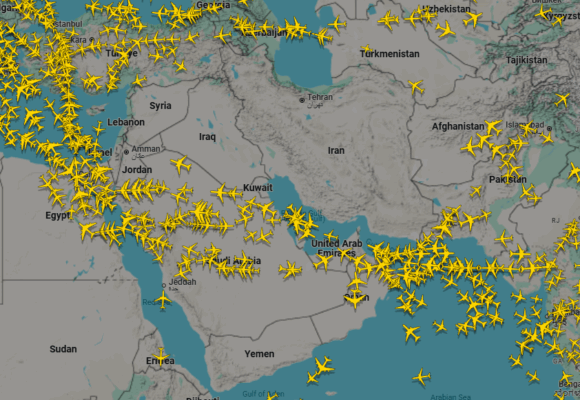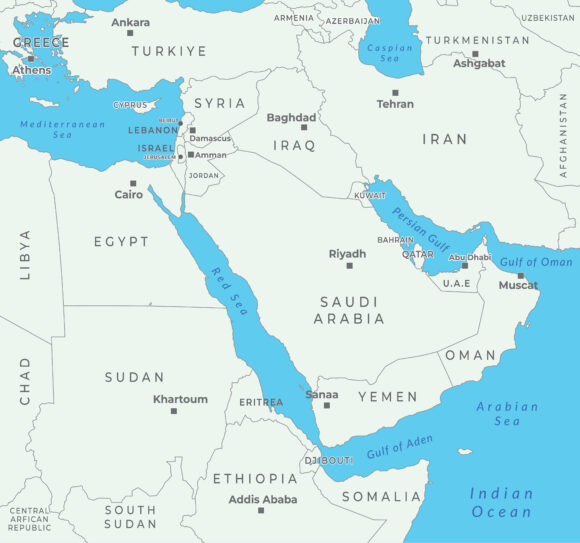On Monday, global airlines were reassessing the duration of their flight suspensions to and from the Middle East, after the conflict in the region intensified. The U.S. launched airstrikes on significant Iranian nuclear facilities, prompting Tehran to declare its intention to retaliate.
Several carriers have recently halted flights to major aviation hubs such as Dubai—the busiest international airport globally—and Doha in Qatar, signaling growing safety concerns within the aviation sector.
Commercial air traffic has been notably absent from the airspace spanning Iran, Iraq, and the eastern Mediterranean for the past 10 days, following Israel’s June 13 airstrikes on Iranian targets. In response, many airlines have diverted or suspended flights in the region, citing closed air routes and security risks.
Singapore Airlines, a major player in the Asian aviation market, labeled the situation as “fluid” and canceled its Dubai-bound flights through Tuesday—an extension of an earlier suspension that had only affected Sunday’s services.
Spanish carrier Iberia, part of the IAG group, also canceled its flights to Doha on both Sunday and Monday. A representative confirmed that the airline is still reviewing whether future services will proceed.
Air France KLM canceled flights connecting to Dubai and Riyadh on both Sunday and Monday. Meanwhile, Finland’s Finnair announced it would not operate its Doha routes at least until Tuesday.
Kazakhstan’s Air Astana also canceled its Dubai service on Monday.
Despite widespread cancellations, some carriers were preparing to resume operations.
Departure data from Flightradar24 indicated that British Airways—also under the IAG umbrella—planned to restart its Dubai and Doha services on Monday, having canceled those flights the previous day.
With most of Russian and Ukrainian airspace still inaccessible due to prolonged conflict, the Middle East has served as a critical corridor for air travel between Europe and Asia. But over the last 10 days of heightened missile attacks and airstrikes, many flights have had to reroute north over the Caspian Sea or south through Egypt and Saudi Arabia.
These extended flight paths contribute to higher operational expenses for airlines, including increased fuel consumption and crew costs. Additionally, the U.S. strikes have triggered a rise in global oil prices, which could push jet fuel costs even higher.
Australia’s Flight Centre Travel Group noted a modest increase in passenger inquiries about avoiding layovers at Middle Eastern airports when flying to Europe.
“The most popular alternate hubs we’re seeing customers request are Singapore, Hong Kong, mainland China, Johannesburg, or even nonstop flights between Perth and London,” said Graham Turner, CEO of the company.
Airspace Safety Concerns

The growing number of conflict zones is placing additional strain on airline operations, as threats of missile strikes or accidental downings of commercial planes increase.
Interference with GPS signals and location spoofing—where incorrect positional data is broadcast from the ground—are becoming more prevalent in politically sensitive areas, posing another challenge to airline navigation.
Flight tracking service Flightradar24 told Reuters it had observed a sharp rise in spoofing and jamming activity over the Persian Gulf in recent days. According to Swiss firm SkAI, which monitors GPS signal disruptions, over 150 aircraft experienced spoofing in just a 24-hour period this past weekend.
Safe Airspace, a platform operated by aviation risk information group OPSGROUP, warned that U.S. airstrikes on Iranian nuclear sites could escalate the risk for American carriers in the region.
This heightened danger could affect airspace in neighboring Gulf nations such as Kuwait, Bahrain, Qatar, Saudi Arabia, Oman, and the United Arab Emirates, according to the platform.
In the lead-up to the American airstrikes, several North American carriers had already suspended Middle East operations. American Airlines paused its services to Qatar, while both United Airlines and Air Canada halted flights to Dubai. These routes have not yet resumed.
While many international airlines are pulling back from the region, some regional operators in countries like Jordan, Lebanon, and Iraq are cautiously restarting certain services after earlier widespread suspensions.
Israel, meanwhile, is expanding flight options to enable citizens and foreign nationals to either return to or leave the country. Israel’s Airports Authority announced plans to operate 24 “rescue flights” per day starting Monday, although each will be capped at 50 passengers.
Outbound flights operated by Israeli airlines are also scheduled to begin on Monday.
El Al, Israel’s national carrier, reported on Sunday that it had received roughly 25,000 requests for outbound travel within just a single day.

